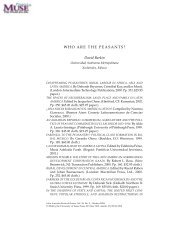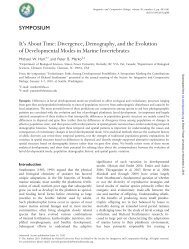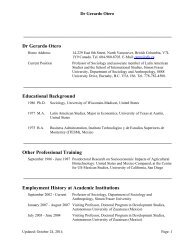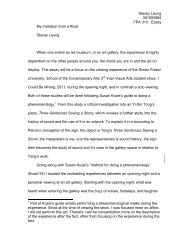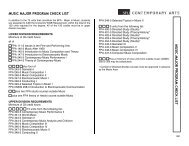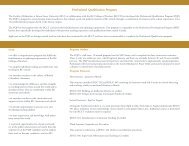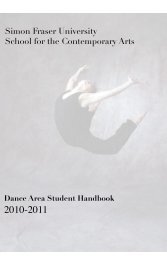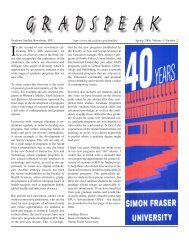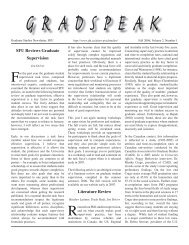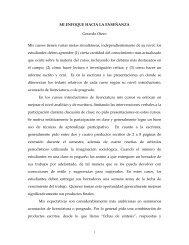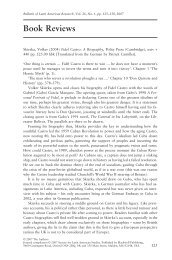Lexicon-Based Methods for Sentiment Analysis - Simon Fraser ...
Lexicon-Based Methods for Sentiment Analysis - Simon Fraser ...
Lexicon-Based Methods for Sentiment Analysis - Simon Fraser ...
Create successful ePaper yourself
Turn your PDF publications into a flip-book with our unique Google optimized e-Paper software.
Computational Linguistics Volume 37, Number 2<br />
SentiWordNet per<strong>for</strong>ms better than either the Google or Maryland dictionaries, but<br />
it is still somewhat low; again, we believe it suffers from the same problem of too much<br />
coverage: Potentially, every word in WordNet will receive a score, and many of those are<br />
not sentiment-bearing words. The General Inquirer lexicon (Stone et al. 1966), the only<br />
other fully manually dictionary considered here, does comparably quite well despite<br />
being relatively small. Finally, the Subjectivity dictionary, with the added strong/weak<br />
distinctions, is the closest in per<strong>for</strong>mance to our dictionary, though significantly worse<br />
when all features are enabled. The comparison is not completely fair to the Subjectivity<br />
dictionary, as it was built to recognize subjectivity, not polarity.<br />
We must note that the comparison is different <strong>for</strong> the Maryland dictionary, where<br />
we turned off negative weighting. This resulted in anomalously high per<strong>for</strong>mance on<br />
the Movies corpus, despite poor per<strong>for</strong>mance elsewhere. In general, there is significantly<br />
less positive bias in the movie review domain, most likely due to the use of<br />
negative terms in plot and character description (Taboada, Brooke, and Stede 2009),<br />
thus the negative weighting that is appropriate <strong>for</strong> other domains is often excessive <strong>for</strong><br />
movie reviews.<br />
Comparing the per<strong>for</strong>mance of various dictionaries with or without SO-CAL features,<br />
two facts are apparent: First, SO-CAL features are generally beneficial no matter<br />
what dictionary is used (in fact, all Overall improvements from Basic to Full in Table 10<br />
are statistically significant); the only exceptions are due to negative weighting in the<br />
movie domain, which <strong>for</strong> most of the dictionaries causes a drop in per<strong>for</strong>mance. 35<br />
Second, the benefit provided by SO-CAL seems to be somewhat dependent on the<br />
reliability of the dictionary; in general, automatically derived SO dictionaries derive<br />
less benefit from the use of linguistic features, and the effects are, on the whole, much<br />
less consistent; this is in fact the same conclusion we reached in other work where<br />
we compared automatically translated dictionaries to manually built ones <strong>for</strong> Spanish<br />
(Brooke, Tofiloski, and Taboada 2009). Interestingly, the Subjectivity dictionary per<strong>for</strong>ms<br />
slightly above the SO-CAL dictionary in some data sets when no features are enabled<br />
(which we might attribute to a mixture of basic reliability with respect to polarity and<br />
an appropriate level of coverage), but its lack of granularity seems to blunt the benefit<br />
of SO-CAL features, which were designed to take advantage of a finer-grained SO<br />
scale, an effect which is even more pronounced in binary dictionaries like the GI. We<br />
can summarize this result as follows: When using lexical methods, the effectiveness of<br />
any linguistic enhancements will to some extent depend on the characteristics of the<br />
underlying lexicon and, as such, the two cannot be considered in isolation.<br />
4. Other Related Work<br />
The SO-CAL improvements described in this article have been directly inspired by the<br />
work of Polanyi and Zaenen (2006), who proposed that “valence shifters” change the<br />
base value of a word. We have implemented their idea in the <strong>for</strong>m of intensifiers and<br />
downtoners, adding a treatment of negation that does not involve switching polarity,<br />
but instead shifting the value of a word when in the scope of a negator.<br />
The bulk of the work in sentiment analysis has focused on classification at either<br />
the sentence level, <strong>for</strong> example, the subjectivity/polarity detection of Wiebe and Riloff<br />
(2005), or alternatively at the level of the entire text. With regard to the latter, two major<br />
35 When negative weighting is excluded (<strong>for</strong> example, the results <strong>for</strong> the Maryland dictionary in Table 10),<br />
SO-CAL features have a positive effect on per<strong>for</strong>mance in the movie domain.<br />
300


